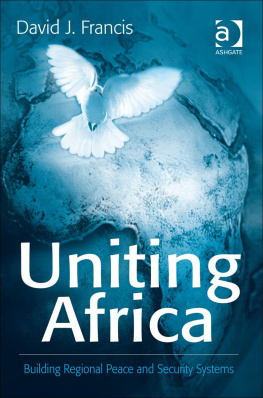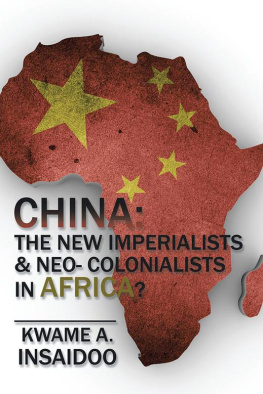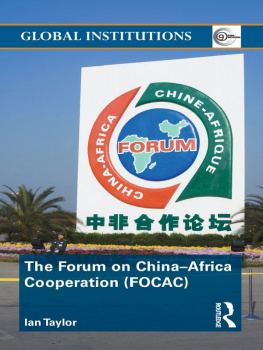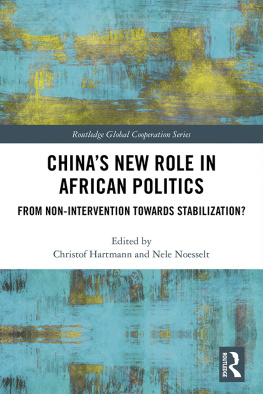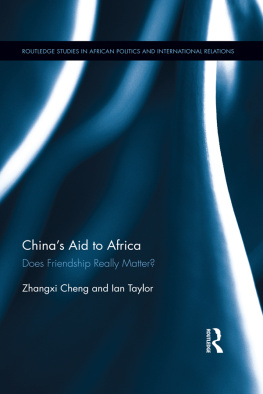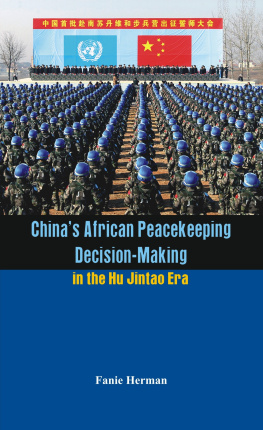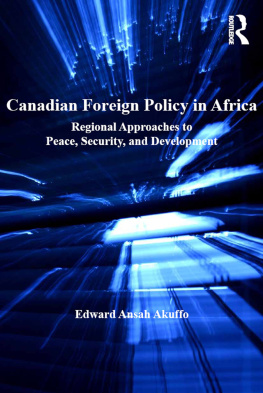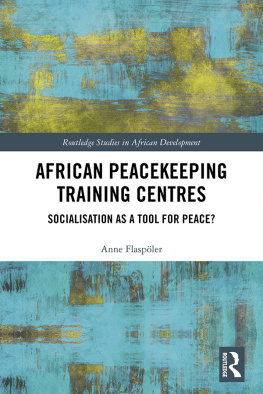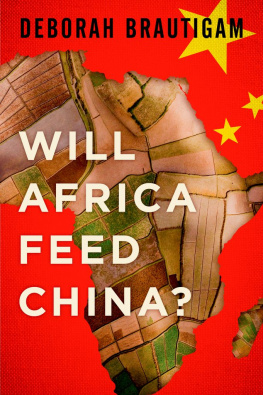
Chinese Peace in Africa
Chinas emergence in Africa is the most significant development for the continent since at least the end of the Cold War. Of the permanent members of the UN Security Council, China is also the largest contributor in terms of troop numbers to UN Peacekeeping Operations (UNPKOs). Whilst Chinas potential to be a force for change in Africa is undeniable, there are wildly varied and sometimes unrealistic expectations in both the West and Africa of Chinas role in Africa. A more detailed and nuanced understanding of Chinese motivations in its African engagement is necessary, in order to work effectively with China for African peace, security and development.
With Liberia, Darfur and South Sudan as case studies, Kuo comprehensively examines the Chinese Peace and places it within the context of the liberal peace debate. He does so using primary sources translated from the original Chinese, as well as interviews conducted in Mandarin with Chinese policymakers, academics, diplomats as well as Chinese company managers and businessmen working in Liberia and South Sudan. He also traces and analyses the Chinese discourse of peace, from traditional Chinese political philosophy, through Mao Zedong and Deng Xiaoping, to post-reform and the Xi Jinping era.
Steven C.Y. Kuo is a Research Associate at Gordon Institute of Business Science, University of Pretoria, South Africa.
Routledge Studies on Asia in the World
The Series is advised and edited by Matthias Vanhullebusch and Ji Weidong of Shanghai Jiao Tong University
Routledge Studies on Asia in the World will be an authoritative source of knowledge on Asia studying a variety of cultural, economic, environmental, legal, political, religious, security and social questions, addressed from an Asian perspective. We aim to foster a deeper understanding of the domestic and regional complexities which accompany the dynamic shifts in the global economic, political and security landscape towards Asia and their repercussions for the world at large. Were looking for scholars and practitionersAsian and Western alikefrom various social science disciplines and fields to engage in testing existing models which explain such dramatic transformation and to formulate new theories that can accommodate the specific political, cultural and developmental context of Asias diverse societies. We welcome both monographs and collective volumes, which explore the new roles, rights and responsibilities of Asian nations in shaping todays interconnected and globalised world in their own right.
Regional Connection under the Belt and Road Initiative
The Prospects for Economic and Financial Cooperation
Edited by Fanny M. Cheung and Ying-yi Hong
Chinese Scholars and Foreign Policy
Debating International Relations
Edited by Huiyun Feng, Kai He and Yan Xuetong
Interpreting the Chinese Diaspora
Identity, Socialisation, and Resilience According to Pierre Bourdieu
Guanglun Michael Mu and Bonnie Pang
Chinese Peace in Africa
From Peacekeeper to Peacemaker
Steven C.Y. Kuo
Find the full list of books in the series here: https://www.routledge.com/Routledge-Studies-on-Asia-in-the-World/book-series/RSOAW
Chinese Peace in Africa
From Peacekeeper to Peacemaker
Steven C.Y. Kuo
First published 2020
by Routledge
2 Park Square, Milton Park, Abingdon, Oxon OX14 4RN
and by Routledge
52 Vanderbilt Avenue, New York, NY 10017
Routledge is an imprint of the Taylor & Francis Group, an informa business
2020 Steven C.Y. Kuo
The right of Steven C.Y. Kuo to be identified as author of this work has been asserted by him in accordance with sections 77 and 78 of the Copyright, Designs and Patents Act 1988.
All rights reserved. No part of this book may be reprinted or reproduced or utilised in any form or by any electronic, mechanical, or other means, now known or hereafter invented, including photocopying and recording, or in any information storage or retrieval system, without permission in writing from the publishers.
Trademark notice: Product or corporate names may be trademarks or registered trademarks, and are used only for identification and explanation without intent to infringe.
British Library Cataloguing-in-Publication Data
A catalogue record for this book is available from the British Library
Library of Congress Cataloging-in-Publication Data
Names: Kuo, Steven C.Y., author.
Title: Chinese peace in Africa: from peacekeeper to peacemaker / Steven C.Y. Kuo.
Other titles: Routledge studies on Asia in the world.
Description: First edition. | London; New York, NY : Routledge/Taylor & Francis Group, 2020. | Series: Routledge studies on Asia in the world | Includes bibliographical references and index.
Identifiers: LCCN 2019020357
Subjects: LCSH: AfricaForeign relationsChina. | ChinaForeign relationsAfrica. | United NationsPeacekeeping forcesAfrica. | Peacekeeping forces, ChineseAfrica. | Peace-buildingAfrica.
Classification: LCC DT38.9.C6 K86 2020 | DDC 327.5106dc23
LC record available at https://lccn.loc.gov/2019020357
ISBN: 978-0-367-02443-7 (hbk)
ISBN: 978-0-429-39956-5 (ebk)
Typeset in Galliard
by codeMantra
This book is based on my research, travels and consulting on China-Africa issues over the past ten years or so. Working with teachers, colleagues, clients and students in the UK, China and across Africa has been a true privilege.
I would particularly like to thank Ian Taylor who supervised my doctoral thesis at the University of St. Andrews and Wu Zhengyu at Renmin University who have really helped me over the years come to terms with China. Id also like to express my thanks to the following for their friendship and insights over the years, in no particular order: He Yin, Stephanie Kappler, Cathrine Jones, Zhang Chun, Patrick Tom, Jiang Henkung, Wang Duanyong, Xiong Wenchi, Ma Jun, Meike de Goede and Xiao Yuhua.
Finally, I would like to thank my parents for their support and my wife Shi Rui for her love and inspiration.
Note on Chinese Names
The Chinese names in this book have been written in the Chinese convention where the family name comes first. For example: Xi Jinping and Zhao Lei. Xi and Zhao are the family names.
During a conference on the liberal peace project in London in 2010, I suggested to two fellow graduate students from Germany that, perhaps, in rebuilding collapsed states such as Liberia, the Singapore Model should be followed. After all, I suggested, like many states in Africa, Singapore was also a colonial creation of the British Empire and the nation also had to rebuild a state from its many different ethnicities. I remember the surprise that overtook my colleagues as they scrambled to explain, as politely as they could, why my suggestions are implausible and that nothing other than a genuine democratic system as is practiced by one of the Western democracies can work in the African context. Later in the year, I presented my paper on Chinese participation in the UN Mission in Liberia at an International Relations (IR) conference in Beijing. When I pointed out that African countries already look to China as a great power and expect support from her for peace operations, the consensus amongst Chinese academics were China did not have the capacity and was certainly not ready to take any leadership role in UN Peacekeeping Operations (UNPKOs). China was not yet ready to abandon Dengs 24 Character foreign policy principle, adopted when Beijing received stronger than expected Western condemnations after the Tiananmen Incident in 1989. The principles were as follows: observe calmly, secure our position, cope with affairs calmly, hide our capacities and bide our time, be good at maintaining a low profile and never claim leadership. Hide your strength, bide your time and never take the lead.


